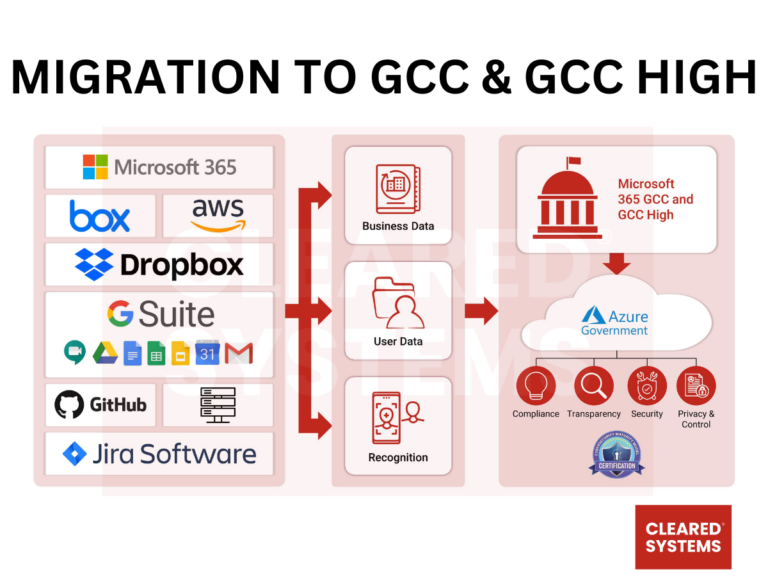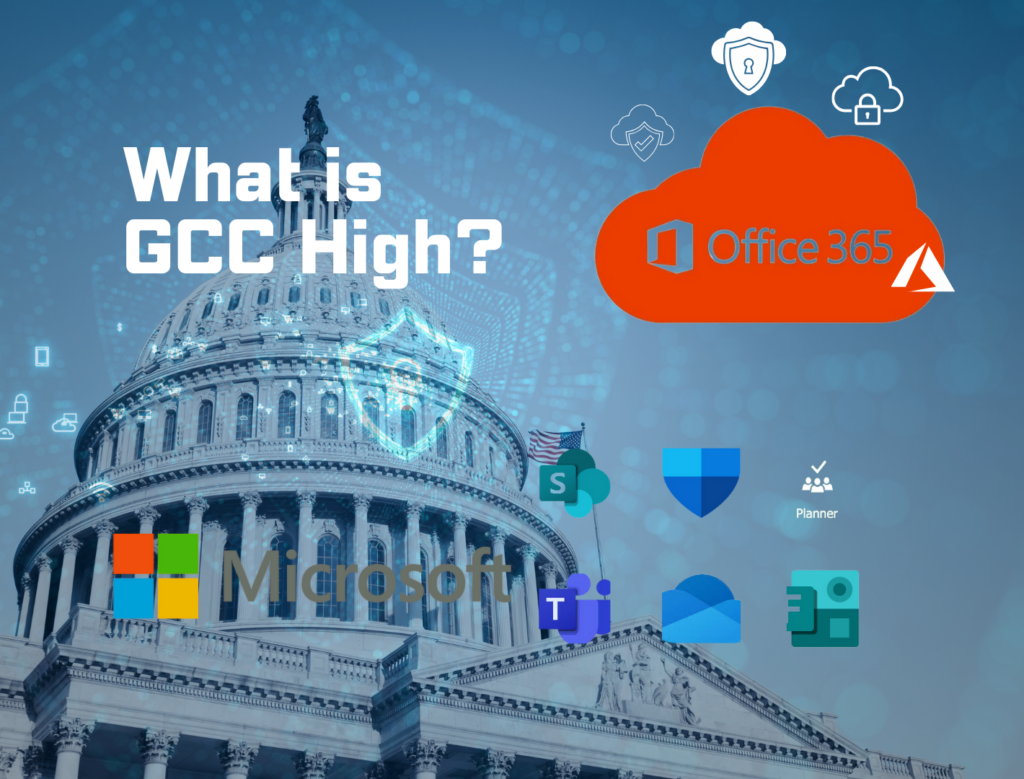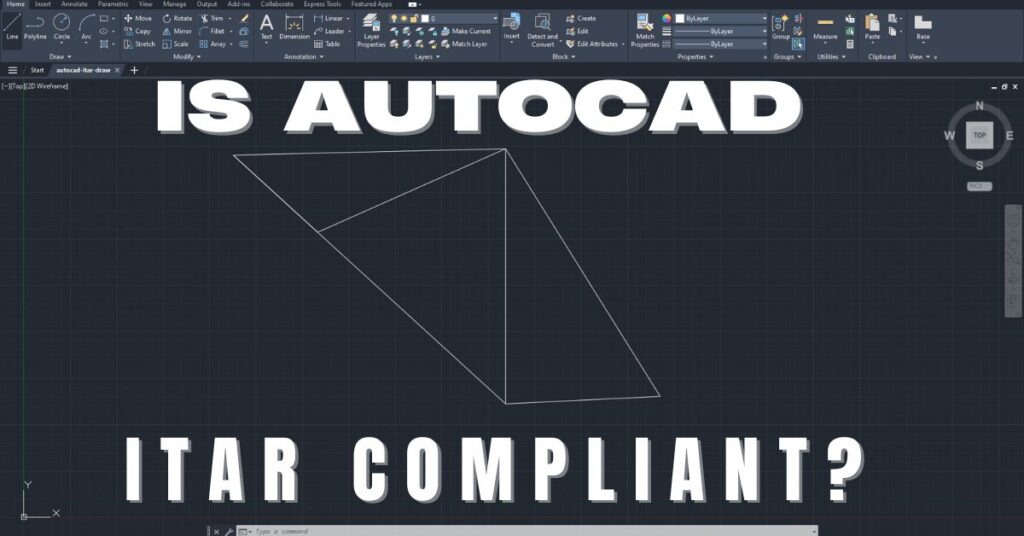Migrating to Microsoft GCC High?
Regardless of the kind of data you hold, protecting it is paramount. However, some data requires more protection and special handling. Government data, in particular, necessitates stringent measures in handling, storing, transmitting, and safeguarding. To meet these requirements, many contractors and subcontractors opt for Microsoft Office 365 GCC High. For many organizations, transitioning to the cloud, specifically Microsoft GCC High, is an initial step in ensuring CMMC 2.0 and ITAR compliance. However, this shift can be daunting without a clear understanding of the prerequisites and challenges associated with Microsoft GCC High migration. In this article, you’ll gain insights into what Microsoft GCC High entails, reasons motivating migration, and the services we provide to facilitate a seamless migration
What is Microsoft GCC High?
Microsoft 365 GCC High is a type of DoD cloud environment intended for DoD personnel, cabinet-level agencies, cleared personnel, and DoD contractors. It meets all the FedRAMP’s high-impact requirements, hence the name. The platform resides on the Azure Government Infrastructure, ensuring higher security than other Microsoft cloud platforms. This cloud platform can be used by the DIB, DoD supply chain and federal agencies subject to certain security and compliance requirements.
Microsoft Office GCC High’s data centers are only located within continental U.S., fulfilling the data residency and sovereignty requirements of the ITAR. Your organization is only eligible for its platform if located in the U.S. and can demonstrate to Microsoft that you are eligible. It uses Azure Government servers physically and virtually isolated for use by federal agencies and Defense contractors only. These Servers use US-only directory services with higher security than the global access servers. Data processing and transmission only happen in the Continental U.S.
Why the Need For Microsoft GCC High Migration?
As a federal contractor or subcontractor, your engagement likely involves handling various levels of controlled unclassified information and critical national security data. Ensuring the secure storage and transmission of such data is imperative. To meet these security demands, Microsoft GCC High migration, especially if dealing with:
- Criminal Justice Information (CJI)
- Covered Defense Information (CDI)
- Controlled Unclassified Information (CUI) and its sub-categories
- Information subject to International Traffic in Arms Regulations (ITAR)
- DoD Unclassified Controlled Nuclear Information
- DoD Impact Level 4 or higher
- Department of Energy Unclassified Controlled Nuclear Information (DOE UCNI)
- NERC information
Additionally, if your contract requires CMMC Level 3 compliance, Microsoft GCC High is a necessity. Compliance with the CMMC 2.0 Level 3 is achievable through Microsoft GCC High. If your contract does not involve the listed types of information, GCC High may not be obligatory. However, if any of these data types are included, Microsoft GCC High migration or implementation becomes imperative.

Critical Factors to Consider During Microsoft GCC High Migration
GCC High Support
Microsoft Office 365 GCC High imposes higher restrictions on connecting to various cloud service providers. Unlike standard configurations that allow-list IP ranges, GCC High adopts a more stringent approach by allow-listing individual IPs. This security measure enhances control over data access and minimizes potential vulnerabilities.
Licensing
Before initiating the Microsoft GCC High migration, it is imperative to verify that your organization meets the eligibility requirements for Microsoft 365 GCC High. Confirm that Office 365 GCC High aligns with your organizational needs, bearing in mind that this specific offering is exclusively available in the United States.
Allow-listing
The traditional method of allow-listing IP ranges is replaced in GCC High with the practice of allow-listing individual IPs. This finer granularity in access control enhances security protocols, providing a more robust defense against unauthorized access.
Migration tools
Employing appropriate migration tools is crucial for a seamless transition. Whether migrating within GCC High or from a hybrid to a GCC High Tenant, selecting the right tool is vital to minimizing user impact. Proper planning and tool selection contribute to a smoother migration experience.
Labelling
Data classification through labeling is a critical aspect of the Microsoft GCC High migration process. Effectively labeling data aids in identifying sensitive information, ensuring that it receives appropriate handling and protection throughout the migration journey. Labelling can either be AIP labeling or Unified Labeling.
Feature parity
Understanding the feature parity between the original environment and Microsoft GCC High is essential. Identifying unsupported features allows for proactive planning and mitigation strategies to address any gaps that may arise during or after the migration.
Eligibility
Regularly verify that your organization continues to meet the eligibility criteria for Microsoft Office GCC High. Compliance with these requirements is fundamental to ensuring ongoing access to the features and services provided within the GCC High environment.
Integration of diverse systems
Seamless integration of diverse systems is crucial for a successful migration. Ensuring that all systems work together harmoniously contributes to a cohesive and efficient post-migration environment.
Data security during migration
Data security remains a paramount concern throughout the Microsoft GCC High migration process. Implementing robust security measures ensures the confidentiality and integrity of data during the transition, safeguarding it against potential threats.
Our Migration Services
OneDrive, SharePoint, Teams, distribution lists, MFA, and exchange online migrations may prove a time-consuming and tiresome activity. If you lack the necessary skills, you may lose data in the process, Cleared Systems can help. We gain actionable insights into your existing content and enrich it using intelligent classification and automated metadata. We then restructure the information to make it easier to find and apply information protection and governance. Our staff has the requisite IT solutions to consolidate and migrate your data to Microsoft GCC High. They use in-depth content discovery and analysis, automated migration and integration, intelligent classification, and protect your data to ensure compliance. In a nutshell, we ensure that your data and metadata are migrated from one platform to Microsoft GCC high without any compromise or loss.
If you are a contractor or a sub-contractor, Microsoft GCC High migration may be a prerequisite depending on the type of data held by your organization. If your contract has either of the above forms of information or wants to be certified in CMMC level 3 or above, you also need to implement or migrate to Microsoft GCC High. At Cleared Systems, our staff is fully equipped with modern technologies to securely migrate your data, ensuring integrity, security, and fidelity. Contact us today for help with content or information migration to Microsoft GCC 365 High.
Share in Social Media
See More Case Studies

Securing Defense Contracts: A DFARS 252.204-7012 Compliance Case Study
Discover how Cleared Systems helped a Federal Contractor successfully achieve DFARS 252.204-7012 compliance by strengthening its cybersecurity posture, giving it a competitive edge when bidding for DoD Contracts.

What is GCC High? For ITAR & CMMC 2.0
Microsoft 365 Government Community Cloud (GCC) High is a specialized cloud solution tailored for U.S. federal, state, local, tribal, and territorial government organizations, as well as for contractors who hold or process data subject to specific security regulations. In this article, we will explore the features, benefits, and differences between Microsoft 365 GCC High and other Office 365 offerings.

Is AutoCAD ITAR Compliant? A Comprehensive Guide for Defense Manufacturers
Defense contractors and manufacturers working with sensitive military technologies face a critical question when selecting computer-aided design software: Is AutoCAD ITAR compliant? This question becomes

How to Get Help in Windows: Guide to Security and Compliance Support
In today’s digital landscape, ensuring your computer systems are secure and compliant with industry regulations is essential for both businesses and individuals. Windows, as one

Microsoft Copilot for GCC High: Enhancing Security and Compliance
In today’s fast-evolving digital landscape, organizations that handle sensitive data, particularly those in government sectors or defense contractors, face growing pressure to maintain strict security
Partner with Us for Compliance & Protection
We’re happy to answer any questions you may have and help you determine which of our services best fit your needs.
Your benefits:
- Client-oriented
- Security
- Compliance
- Peace of mind
- Efficiency
- Trust
What happens next?
Schedule an initial meeting
Arrange a discovery and assessment call
Tailor a proposal and solution
